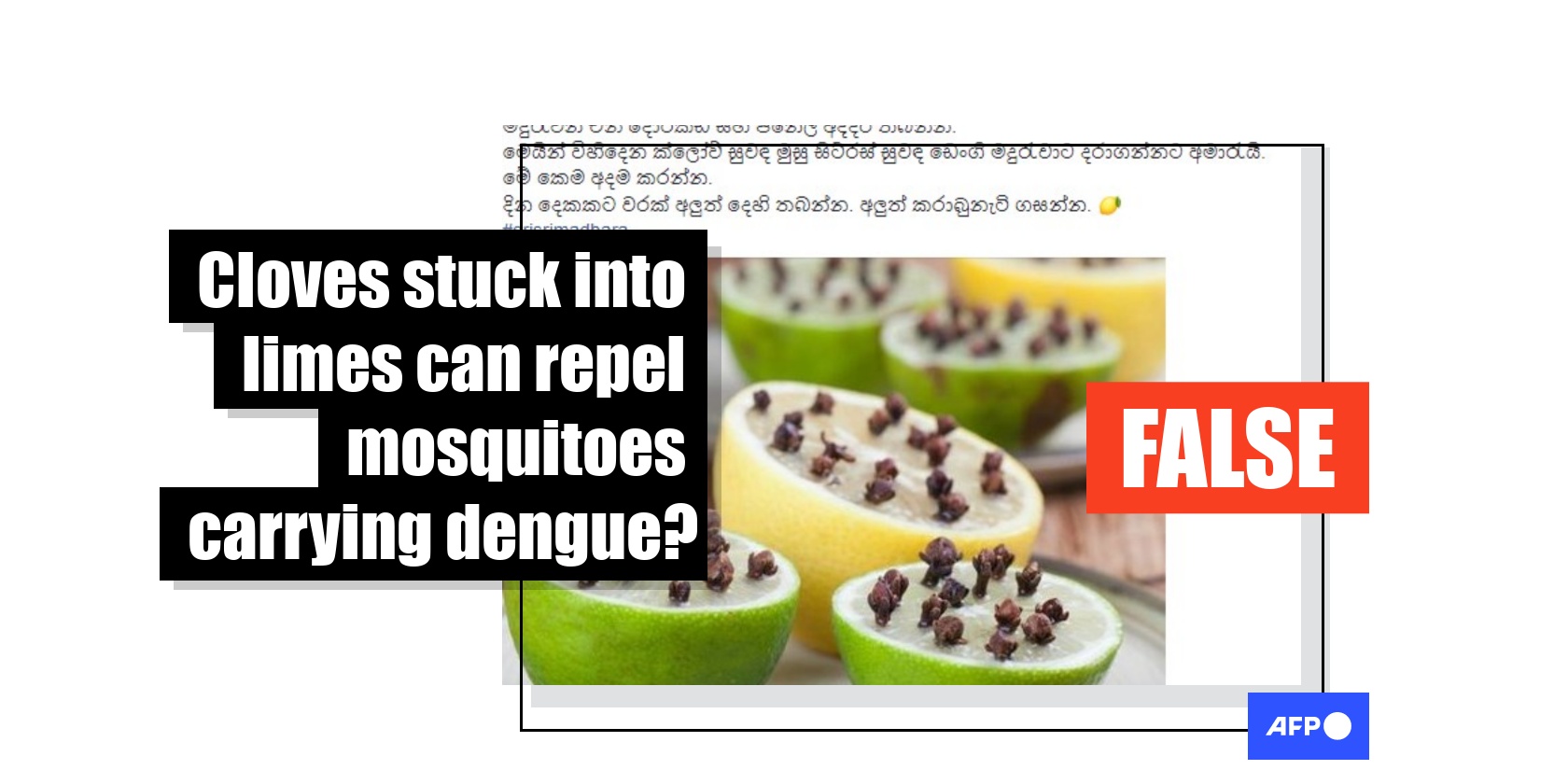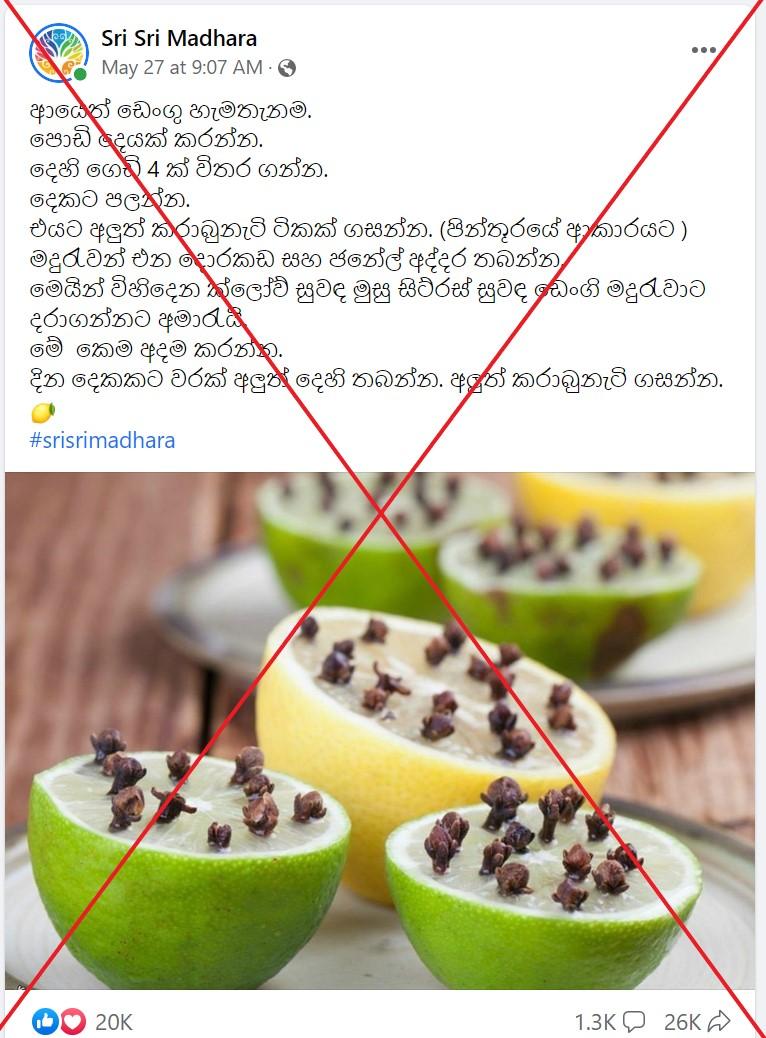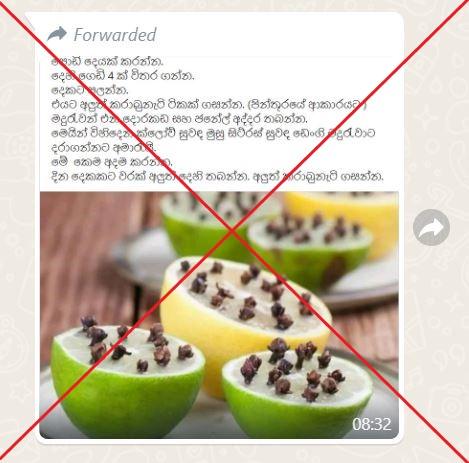
Experts rubbish claims that clove and citrus are 'effective' dengue mosquito prevention
- This article is more than two years old.
- Published on June 20, 2023 at 07:59
- 3 min read
- By AFP Sri Lanka
The Sinhala-language claim has been shared more than 26,000 times since it was posted on Facebook here on May 27, 2023 alongside an image of citrus fruit with cloves stuck into the flesh.
"Just do this minute task to keep dengue mosquitoes away. Take about four limes, cut them in half. Stick some new cloves in each half and place them near doors and windows," the post says.
Dengue -- a disease with symptoms ranging from fever, headache and joint pain to bleeding, organ failure and, in some cases, death -- is primarily spread by the Aedes aegypti mosquito that lays its eggs in standing water (archived link).
The Facebook post states mosquitoes that spread dengue cannot tolerate the combined smell of the fruit and spice and that the "repellent" should be replaced every two days.

The claim this lime and clove combination acts as a natural repellent has circulated for years on social media, including on Facebook here, here and here.
It resurfaced with the false claim it could keep "dengue mosquitoes away" as Sri Lankan health authorities issued a warning in May that cases of dengue in the country could surge and potentially surpass the previous year's record of 11,000 infections in June and July (archived link).
This false claim was shared elsewhere on Facebook here and here, as well as on WhatsApp.

But public health experts and an entomologist warned the public against considering it as a method to repel mosquitoes.
Ensure clean surroundings
Dr Lahiru Kodituwakku from the Sri Lankan Ministry of Health's National Dengue Control Unit (NDCU) told AFP on June 15 the claim is extremely misleading and warned against relying on rumours circulating on social media to keep mosquitoes away (archived link).
Kodituwakku said: "Citrus and clove are considered natural repellents against bugs and insects in concentrated forms. Even so, their efficacy lasts only a few hours.
"Most importantly, there is no scientific evidence to claim this 'remedy' described in the post will keep dengue mosquitoes away."
He urged the public to follow public health advice issued by the NDCU.
"The priority task in dengue prevention should be to clean the surroundings and ensure they are free of mosquito breeding spots," he said.
The NDCU website lists only citronella oil, neem oil and lemongrass oil as effective natural repellents (archived link).
Sri Lanka's Health Promotion Bureau also told AFP on June 7 they strongly advise people against relying on internet rumours to protect themselves and their families from dengue.
The bureau referred AFP to the NDCU for further dengue prevention advice.
False sense of security
Using the method shared in the false posts could result in a "false sense of security" as there was no evidence to support it, said Daniel Markowski, a technical adviser at the American Mosquito Control Association (archived link).
Markowski told AFP on June 7 that plant extracts or essential oils may display a certain level of efficacy as repellents.
"Concentrated clove oil can have repellent properties. But, simply placing cloves, alone or combined with other fruits, around your home will almost certainly not repel mosquitoes," he said.
Copyright © AFP 2017-2026. Any commercial use of this content requires a subscription. Click here to find out more.
Is there content that you would like AFP to fact-check? Get in touch.
Contact us
